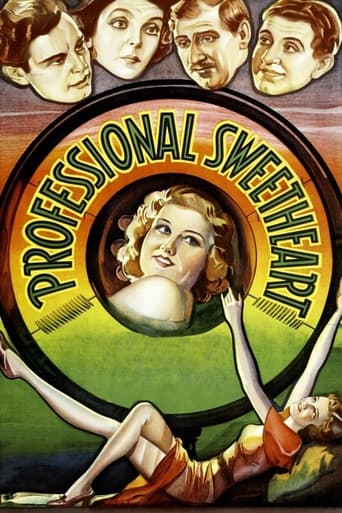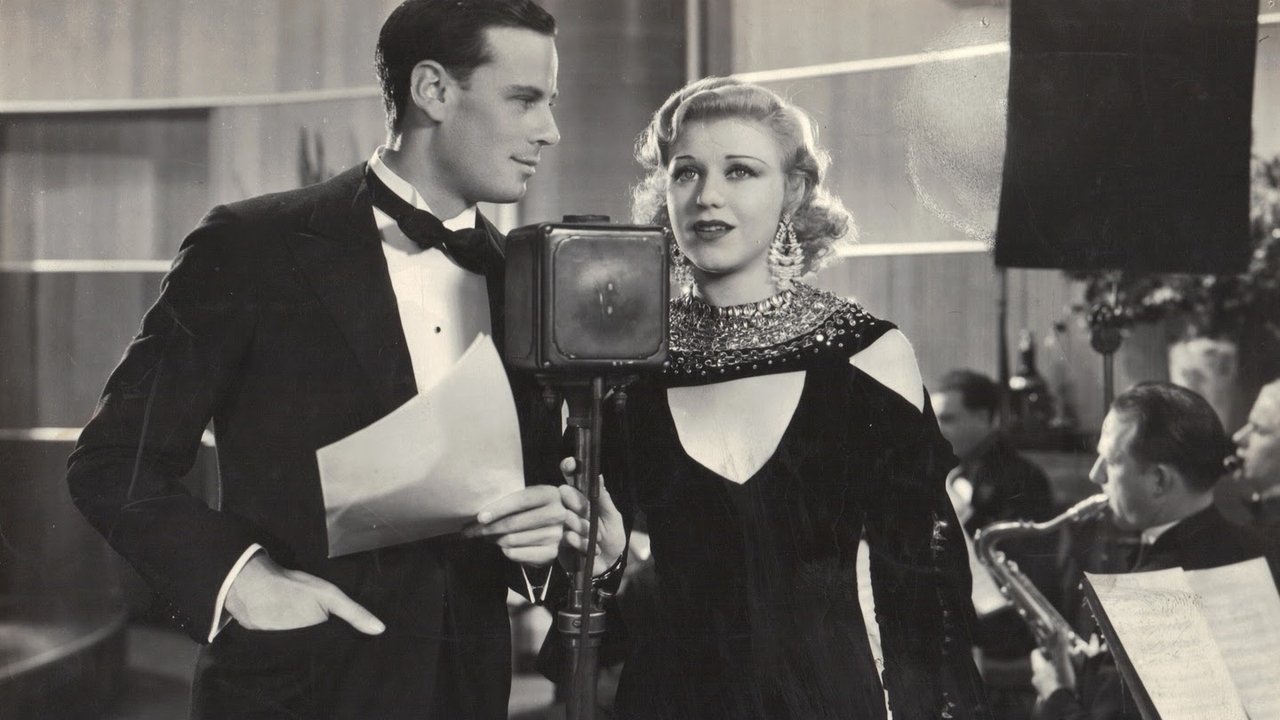weezeralfalfa
Supposed to be a light romantic comedy satirizing several aspects of radio programs. Ginger Rogers, in her first RKO film, plays an ex-orphan who has been remade into 'the Purity Girl'(Glory Eden), singing and talking on the radio program sponsored by Ippsie Wippsie wash cloth, owned by Sam Ipswich(Greggory Ratoff). She is billed as a girl who doesn't do any of the usual 'sinful' things of girls her age. In fact, the company insists that she actually live up to her image 24 hr. a day, something she resents, since such a life is very dull to her. Thus, she balks at signing a 5 year contract to continue this lifestyle. This is a satire on manufactured squeaky clean images of radio stars promulgated by sponsors and studio bosses. Another bit of sarcasm is directed at radio sponsors, whose often inane jingles tells the listener nothing important about their product. Also, obviously, this is a simple inexpensive item which is not bought very often., thus is of low value for expensive advertisement. In later years the occasional film(as "Always Fair Weather" satirized similar commercials on TV. Interestingly, the word 'television' is mentioned once, suggesting that it was a recognized term 15 years before it was commercialized, having been invented already.
There are a few scenes that would have been censored out by the Production Code going into effect late the next year. Several times, Ginger removes her dress to show her underwear, even dancing around in it. Nothing special for today's audiences, but considered daring at that time. What about the brief spanking scene? I don't know how often such scenes were censored out once the Production Code went into full effect, but I do know that the occasional film slipped through, as in "Frontier Gal", "Across the Wide Missouri", "McClintock", and "Kiss Me Kate". I'm surprised such scenes were allowed in the era of strict censoring. After the women's lib movement, I haven't noticed any such incidents.....Toward the end, Ginger signs a contract with the Kelsey dish rags company , to continue her radio singing, because they allowed her to cheat on her 'Purity Girl' image. Her new husband, Jim(Norman Foster) simultaneously signed a contact with the Ippsie Wippsie company to recite poetry over the radio. But, he insisted on his wife singing between his poetry readings. This problem was solved by a merger of the two companies. Yes, very silly, as is a good part of the film in general. But, it's seldom really funny, which is the main problem with this film. The other featured players include Zasu Pitts, who provides a bit of humor, Frank McHugh, Allen Jenkins, swishy Frank Pangborn, Edgar Kennedy, and Frank Kalrien. See it on YouTube
marcslope
I'd been looking forward to this RKO programmer because it's by Maurine Watkins, a pretty smart writer who also was responsible for the play "Chicago," which became the movie "Roxie Hart," then the musical "Chicago." So she clearly knows about the value of publicity and the hypocritical nature of advertising and sponsorship. But those satirical targets are swiped at very broadly in this one, which keeps parading the name of the sponsor--Ippsie Wippsie--as if it were in itself hilarious. They're sponsoring a singing sweetheart, a dubbed Ginger Rogers, who personifies wholesome values and, predictably, is really the opposite of those values. I find Ginger's outbursts and shifts of mood unpersuasive and a little tedious, and she's surrounded by a supporting cast of Warners and RKO players who do what they always do--a simpering ZaSu Pitts, genial Frank McHugh, Brooklyn-streetwise Allen Jenkins, sputtering-in-a-foreign-accent Gregory Ratoff, swishy Franklin Pangborn, etc. Her leading man, Norman Foster, as a Kentucky farm boy who successfully woos her, is no great shakes, and Ms. Watkins also asks us to believe that a short time with him in the mountains would turn Ginger from a grasping spoiled brat who can't cook into a darling, kitchen-trained little wifey. The plot reversals are quick and unconvincing, and the bashing of the advertising industry is positively sledgehammer.
mgconlan-1
"Professional Sweetheart" was Ginger Rogers' first film for RKO studios after she left Warner Bros., and with Allen Jenkins and Frank McHugh in the supporting cast it almost seems like a Warners film in exile. It's a marvelous movie, smart and funny, with a script by "Chicago" author Maurine Watkins that, though it isn't a crime story, takes up another of Watkins' favorite themes: media manipulation and the gap between what we're told about celebrities and what they're really like. In "The Fred Astaire and Ginger Rogers Book," Arlene Croce wrote, "Almost any Ginger Rogers role is successful to the degree that it reflects the dualism in her personality (tough-vulnerable, ingenuous-calculating) or plays on her curious aptitude for mimickry or fantasy or imposture." Croce was writing about the major roles of her post-Astaire career "Bachelor Mother," "Tom, Dick and Harry," "The Major and the Minor" but it applies here just as well; by casting Rogers as a wise-cracking hard-bitten orphan girl forced to pose as the "Purity Girl," and having two radio sponsors and a husband (from an arranged marriage!) all with their own ideas of what they want from her, "Professional Sweetheart" gives Rogers an early showcase for the characteristics that would have made her an enormous star even if she'd never set foot on a dance floor with Fred Astaire. I can't understand why some of the other commentators on this film have criticized Watkins' script, since it seems to me to be well constructed and vividly satirical on celebrity and its discontents in a way that rings true even today.Another thing I liked about "Professional Sweetheart" is that it's one of the Gayest movies Hollywood ever made so much so that I can't understand why TCM isn't showing it in their current "Screened Out" festival of Gay and Lesbian films when some other titles with much more peripheral Gay content did make their list. The supporting actors seem to be competing as to who can be the queeniest, with Franklin Pangborn (not surprisingly) winning: his looks of horror and disgust when any of the other characters suggests that he date a woman are priceless. Also pretty astonishing, even for the relatively liberal "pre-Code" era in Hollywood history, is Sterling Holloway's obviously cruising Allen Jenkins at the reporters' reception imagine a Gay scene involving Jenkins in which he's the butch one!
elansix
This is a very early film in the career of Ginger Rogers. It is somewhat saucy and always goofy. It portays people in radio show business and the press that covers it as both overly ambitious and naive. There are several character actors such as Zazu Pitts that are totally hilarious. The plot is basicly girl wants fun and freedom rather than fame, and boy wants girl. After several very funny misadventures they both get what they want and each other. Sexuality is very frank in this movie even though the characters are very innocent. For the naughty in us there is even a spanking scene. Ginger Roger's voice is dubbed in a couple of songs because the producers did not think she was good enough. A very funny film worth repeated viewings. It can be seen occaisionly on the Turner Movie Channel. In the final scene there is a reference to television long before it would become available as if it was just around the corner.


 AD
AD


